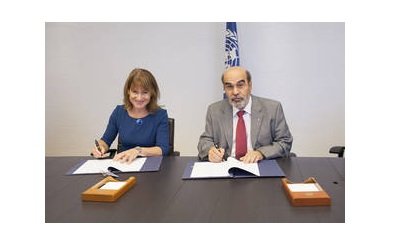Inside BENEO’s new pulse plant: pioneering sustainable protein from faba beans
The Thomson Reuters Foundation (TRF), the corporate charity of the world’s biggest news and information providers, is teaming up with the UN Food and Agriculture Organisation (FAO) to improve global information and awareness on hunger and food-related issues including food production, food security, food waste, agriculture, land use, and malnutrition.
An agreement signed on July 9 at Rome by FAO Director-General, José Graziano da Silva and the TRF Editor-in-Chief, Belinda Goldsmith outlines a number of joint activities to be undertaken by the organisation and the foundation’s global team of journalists covering humanitarian issues, women’s rights, human trafficking, the human impact of climate change and corruption.
Speaking at the signing event, Graziano da Silva said, “This is a strategic alliance with an institution that has a longstanding commitment to free independent journalism, to human rights, to women’s empowerment, and to the rule of law.”
“We cover the worlds under reported stories,” said Monique Villa, CEO of the TRF, “this new partnership is perfectly in line with our core values, and I am extremely happy and confident we will deliver the necessary impact, boosting awareness and triggering change”.
A new online platform on hunger and nutrition
The agreement foresees the creation of a new section on trust.org, the TRF portal, entirely dedicated to delivering news content on hunger and food issues to be launched next fall. Topics to be covered will include food production, food security and safety, food waste, agriculture and land use, under nutrition and malnutrition, and food affordability among others.
Media’s critical role in transforming lives
Under the shared view that trusted news and information is a key tool in the fight for human rights and specifically against hunger, the partnership aims to highlight the importance of providing accurate, updated and helpful information about hunger, nutrition and food production challenges.
“I am fully convinced that the media play a critical role in every society, not only informing and raising people’s awareness, but also being able to transform their lives,” Graziano da Silva said. This potential is “far more significant when it can benefit and change the lives of people who suffer from chronic hunger and improve their food security,” he added.

